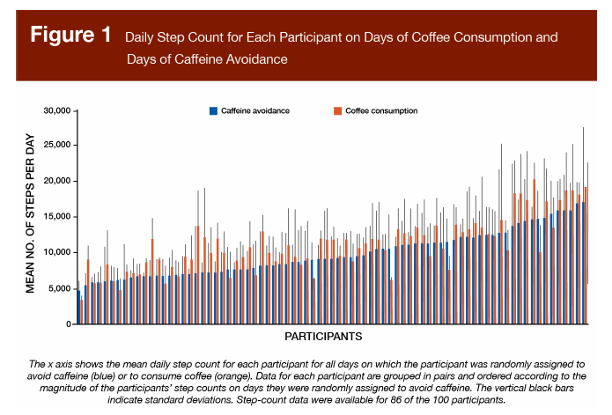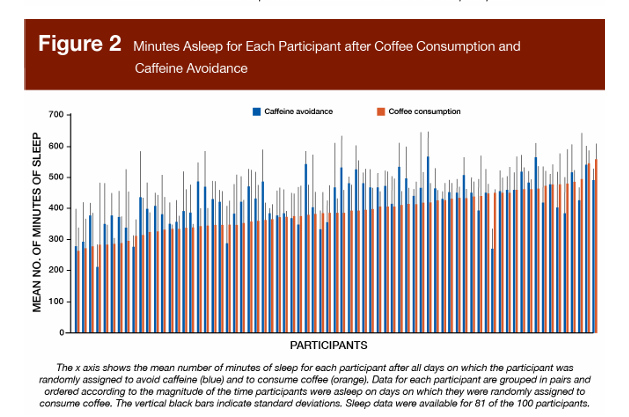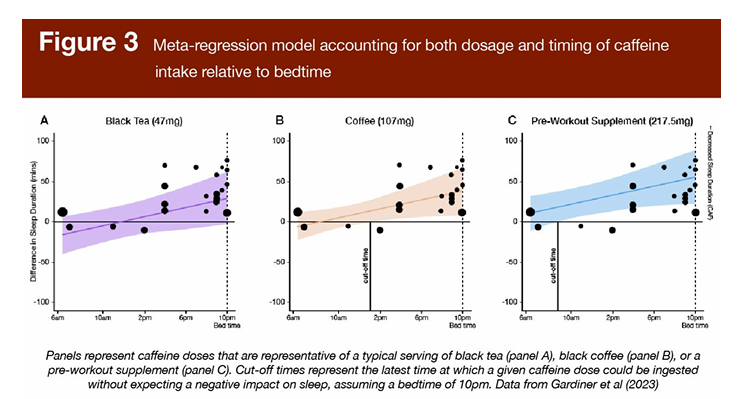Let’s be honest: caffeine is probably the world's most socially acceptable performance enhancer. You can get it at a gas station, sip it on Zoom calls, and crush it 20 minutes before PR-ing your deadlift.
A recent study decided to dig into the fine print. Researchers examined how caffeine affects sleep, step counts, and heart rhythms in 100 healthy adults. They used ECG patches, Fitbits, and glucose monitors — not your average “vibes-based” caffeine study.
What they found is a wake-up call (pun very intended).
🧠 The Good News First: Caffeine Does Something
Let’s give caffeine its flowers: it works.
- On coffee days, participants took 1,058 more steps, averaging 10,646 vs. 9,665 on non-caffeine days.
- Participants reported feeling more alert and energized — exactly what you’d hope for after that $6 cold brew.
- Caffeine also acutely improves strength, endurance, and power, confirmed by multiple meta-analyses.
So yes, the pre-lift espresso shot or pre-workout scoop can help you crush your sets harder than your playlist ever could.


😴 But Here’s the Price Tag
- On average, people slept 36 minutes less on caffeine days.
- Premature ventricular contractions (a type of heart arrhythmia) increased.
- And some participants experienced sleep reductions of nearly an hour, depending on their caffeine metabolism genotype.
To be clear: most of these heart blips weren’t dangerous. But they do raise flags, especially for folks with underlying conditions or who are stacking 400 mg+ before 4 p.m. like it’s NBD.
If caffeine were a supplement with zero cultural baggage, we'd probably talk about it the way we do creatine or ashwagandha: “Useful? Sure. But dose matters. And it’s not for everyone.”
🧬 Genetics Matter… Kinda
The study broke participants down by genotype:
- Fast caffeine metabolizers (rare) gained sleep on caffeine days. Weird flex, but okay.
- Slow metabolizers? Lost 47 minutes per night on average.
- Moderates were somewhere in between — not spared, just less punished.
Here’s the catch: only 13 people had the “fast” genotype. So don’t assume you’re one of them just because you fell asleep after that 5 p.m. cold brew. Odds are, caffeine is messing with your sleep, whether you feel it or not.

🤔 But What About Habitual Users?
Caffeine loyalists often say:
“I’m used to it. It doesn’t affect me anymore.”
Sure… but that might be the problem.
In the study, habitual caffeine drinkers lost less sleep than newbies, but still lost ~29 minutes a night on average. That’s not nothing.
And here’s where it gets even more meta: many of the "performance benefits" we think caffeine gives us may just be withdrawal reversal.
You feel better with caffeine, not because it makes you better, but because it temporarily relieves the fog caused by not having it. That’s not performance enhancement. That’s just getting back to baseline.
🏋️♂️ Does It Improve Long-Term Performance?
Now we’re getting to the heart of it (again, not a pun… okay maybe a little).
Caffeine gives you a short-term boost. But:
- There’s very little research on how it impacts training adaptations over time.
- One study hinted that caffeine’s effects diminish over 20 days of repeated use.
- Others suggest habitual users might just be using caffeine to overcome dependency symptoms, not to boost performance beyond baseline.
So while caffeine might make today’s lift feel better, we still don’t know if it leads to bigger muscles, faster times, or stronger PRs 12 weeks down the line.
💤 Let’s Talk About Sleep
Sleep is your recovery engine. It’s the unsung hero of muscle growth, mood stability, and motivation. And caffeine? Well, it's often the villain.
- In 2013, a study showed that 400mg of caffeine impairs sleep even when consumed 6 hours before bed.
- A more recent meta-regression found that 217mg needs to be cut off 13 hours before bed to avoid disruption.
- 107mg? 9 hours.
- Under 50mg? You’re probably okay… maybe.
TL;DR: Unless you’re microdosing your coffee at dawn, caffeine is likely undermining your recovery, even if you’re getting 7–8 hours.
⚠️ What About Heart Health?
This study found a bump in ventricular arrhythmias on caffeine days. Again, not necessarily dangerous for healthy people, but worth noting — especially if you:
- Have anxiety
- Experience heart palpitations
- Have a family history of arrhythmias
- Drink caffeine like it’s water
For most, the risk is low. But for those with conditions like Long QT syndrome, caffeine could increase the risk of serious events, which is why checking with a doc if you’re dealing with heart weirdness is always smart.
🧪 So… Should You Quit?
Not necessarily. But it’s worth asking:
- Am I using caffeine to boost performance… or just to function?
- Does caffeine help me train better… or just feel awake enough to train?
- Am I sleeping well… or just numb to exhaustion?
One of the researchers, a former 500mg/day guy, gave up caffeine for a month after getting sick. The result? Less anxiety, fewer headaches, better sleep, and no noticeable drop in gym performance. Just… fewer excuses.
🧠 Bottom Line: Caffeine Isn’t Bad — But It’s Not Magic
Caffeine helps, but it doesn’t transform. For most people, it’s a helpful tool. For others, it’s a sneaky stressor.
✅ It can increase physical activity
❌ It may hurt sleep
⚖️ It’s a trade-off — and one worth calibrating
If you’re thriving with it, keep sipping. But if you’re dealing with low energy, crappy sleep, or anxiety… maybe give your nervous system a break.
Whether you’re fueled by caffeine, creatine, or sheer spite, JDefines helps you train with clarity.
They don’t just optimize workouts. They optimize you:
- 📈 Science-backed training that accounts for sleep, recovery, and adaptation
- 🧠 Personalized coaching that cuts through hype
- 💬 Daily messaging and weekly accountability calls
JDefines meets you where you are, with or without a cup in hand.


